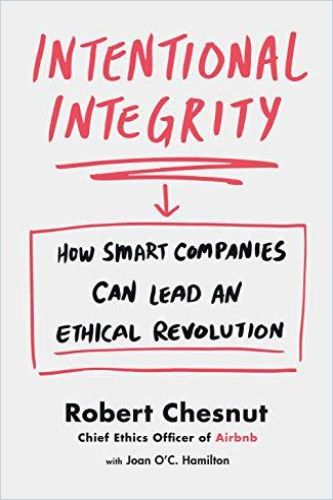The chief ethics officer at Airbnb Robert Chesnut explains why you need a unique corporate code of ethics, and he tells you how to create, disseminate and enforce it.

Enforcing Ethical Behavior
Organizational ethics are a new frontier, argues Robert Chesnut, chief ethics officer and former general counsel of Airbnb and a former federal prosecutor. Ethical missteps, Chesnut says, can be costly and damaging, so companies need a clear road map showing executives and employees what they can and cannot do. He insists that specific guidelines will help your people do the right thing. They will also respond to a constant emphasis on integrity issues, especially when top executives deliver the message.
To his credit, Chesnut doesn’t gloss over the challenges of getting people to behave ethically. He cites an array of possible ethics issues, including sexual harassment, office romances, intoxication at work, fudged expense accounts, conflicts of interest and mishandling of private data. Building a culture of integrity requires hard work, and Chesnut makes a compelling case for that effort.
A very small number of rogue employees can have an outsized negative impact on your reputation.Robert Chestnut
Publishers Weekly said, “This is the rare fully realized look at not just what integrity means in the context of business, but how to make it second nature in the workplace. Business leaders should take note.” Kirkus Reviews wrote, “Chesnut offers plentiful examples of common integrity issues…He is especially good on such matters as enforcing consequences and handling situations involving violators who are high-performing employees. Valuable reading for companies that want to get serious about workplace ethics.”
Ethical Decisions
Chesnut is adamant that companies must create their own road maps for fulfilling ethical values.In his role at Airbnb, Chesnut was proactive about making sure it didn’t mimic the negative behaviors of some other Silicon Valley companies. He led an effort to write a code of ethics, a project he vowed not to outsource. Then he traveled the world delivering his message about ethics to Airbnb employees. His Intentional Integrity approach simply teaches people to ask: “What is the right thing to do?”
Your employees must make judgment calls, Chesnut notes, when complying with government regulations or choosing whether to blow the whistle on questionable behavior by their colleagues or bosses.
Eventually you’re going to want to be able to draw a straight line from every core value to every rule in the code of ethics.Robert Chesnut
To create a corporate code of ethics, Chesnut advises forming a diverse committee representing various aspects of your organization. He cautions you not to let the CEO or the chief ethics officer write the rules by themselves because that fuels the “Moses syndrome,” where one person in the bureaucracy delivers the commandments. Chesnut believes multiple people thinking deeply about questions of integrity will produce a profound and meaningful document.
Intentional integrity, he explains, rebukes the corporate ethos that says companies can’t afford ethics. He offers the example of the outdoor products company Patagonia, which made headlines in 2019 when it said it would stop filling orders for fleece vests from suppliers who didn’t “prioritize the planet.”
The “Six Cs”
As he created Airbnb’s ethics code, Chesnut chose the Six Cs framework:
If you delegate the training to a mid-level HR manager, you are suggesting that it just isn’t very important.Robert Chesnut
The Cs include the CEO, who must support the code of ethics; customization, in that your code must align with your values and brand; communication, alerting top-level executives to communicate the message in person and with passion; clear reporting, telling companies to remove barriers that prevent employees from reporting violations; consequences, stressing the need to enforce your code, and impose clear consequences evenly; and constant practices, like repeating the ethics message frequently and in various formats.
Apologizing
In the early days of Airbnb, Chesnut relates, a host posted on her blog about renting her apartment. She recounted that tenants stole jewelry, damaged clothing and set a fire in the fireplace with the flue closed.
If a CEO instead acts with integrity and expects it from others, it’s more likely to be the default option throughout the organization.Robert Chesnut
The author says CEO Brian Chesky faltered as Airbnb leaned on corporate policy claiming that it was not responsible for the damage. Chesnut recounts that, at first, the company asked the host to take down her blog post, which inflamed the situation. Then, Chesnut discloses, Chesky decided that Airbnb would pay for $5,000 worth of insurance on every property, making the ethical choice to take responsibility.
Chesnut also admires Starbucks CEO Howard Schultz. After a store manager – in an incident that hurt the company’s reputation – called the police because two Black men wanted to use his shop’s bathroom without buying anything, Schultz instituted company-wide training to counteract racial bias.
Sexual Harassment
Chesnut cites a 2018 survey finding that 38% of women in white-collar jobs had experienced or witnessed sexual harassment in the workplace – and more than a quarter had endured or seen unwanted physical contact. He laments that nearly half didn’t think it was worthwhile to even report such troubling conduct.
Employees at many companies have no confidence that reports will be taken seriously, and they believe that reporting is futile and can result in career suicide.Robert Chesnut
Chesnut strongly states that sexual assault – unwanted and intentional physical contact – is always a crime. He concedes that sexual harassment, such as unwelcome comments or off-color jokes, typically isn’t a crime, but he insists that a company that tolerates such behavior is engaging in a crime.
Chesnut explains that Airbnb and Facebook both have imposed an “ask out once” rule to stifle sexual harassment. The rule says an employee can ask a co-worker out once. After one no, the author explains, further requests violate Airbnb’s code of ethics.
Sexual and other forms of harassment or discrimination are debilitating and distracting for victims, with the effects often lasting long after the behavior occurs.Robert Chesnut
Chesnut stresses that companies must communicate that they won’t tolerate sexual harassment. They must create a fair reporting process and a fair way to respond to accusations.
Required Reading
Chesnut provides a utilitarian, pragmatic, easy-to-follow and necessary guide for creating a code of ethics. Top executives and HR personnel will benefit from his clear guidance and practical approach. Chesnut’s sincerity, and his unimpeachable record of writing and promoting ethics at Airbnb, only increases the commonsense power of his advice – no one can say Chesnut doesn’t walk his talk. His tone is straightforward, and he builds his positions with logic and care. He writes to be understood and succeeds. Every company will welcome Chesnut’s route to an equitable, enforceable, applicable ethics code.
We have not declared war on fun. What we have done is make clear that the workplace, like every other aspect of life, must have boundaries.Robert Chesnut
Other works addressing institutional integrity include Inclusify by Stefanie K. Johnson, Stand Your Ground by Evan H. Offstein and Empowered by Marty Kagan and Chris Jones.




